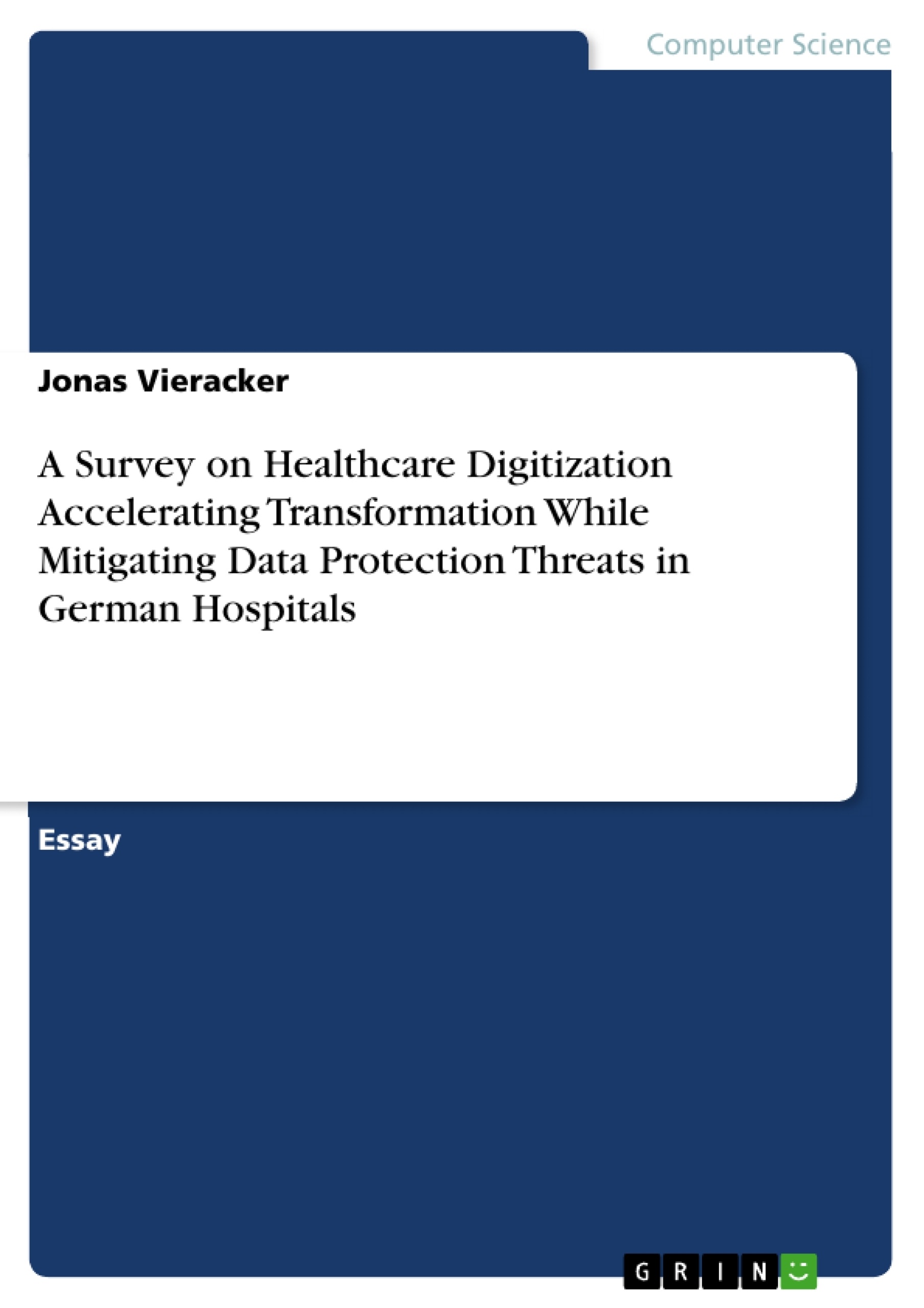The digital transformation of the healthcare industry did become a trending topic in Germany of the recent years. Causes for it have been the latest technological developments, Big Data, and the need for medical elucidation of patients. Unfortunately, Germany is not considered to be the pioneer in digitizing medical care in comparison to leading countries in the European Union, although the opportunities are promising. Next to ethical and technical challenges one major threat is created by the high quality of data security, which is required by German and European law, especially starting from 2018, when the new EU General Data Protection Regulation is entering into force.
This survey paper will firstly shed a light on opportunities and challenges of healthcare digitization in Germany before elaborating on the detailed root causes of harming the digitalization. The main focus will be to provide high quality data security in hospital IT in line with the applying laws and regulations. Therefore, two approaches by different authors will be assessed and compared.
Inhaltsverzeichnis (Table of Contents)
- Introduction
- Opportunities and Challenges of Healthcare Digitization
- Leveraging Healthcare Digitization Opportunities
- Analyzing Healthcare Digitization Challenges
- Healthcare Data Security - Laws and Regulations
- Data Security Issues in Hospitals
- How to Provide High Quality Data Security
Zielsetzung und Themenschwerpunkte (Objectives and Key Themes)
This survey paper explores the opportunities and challenges of healthcare digitization in Germany, focusing on the critical issue of data security. The paper aims to analyze the factors hindering digital transformation in German hospitals and propose approaches to enhance data security in line with legal requirements.
- Opportunities and challenges of healthcare digitization in Germany.
- Data security threats in hospitals and the need for effective mitigation strategies.
- Analysis of existing data security solutions and their strengths and weaknesses.
- The impact of the new EU General Data Protection Regulation (GDPR) on healthcare digitization.
- The role of technology and human factors in successful healthcare digitization.
Zusammenfassung der Kapitel (Chapter Summaries)
The introduction provides context for the study, highlighting the significance of digital transformation in the healthcare sector and the current state of digitization in German hospitals. It also outlines the key themes and structure of the paper.
The first chapter explores the opportunities and challenges of healthcare digitization in Germany. It discusses potential benefits such as improved patient care, data-driven insights, and streamlined processes, while also addressing concerns regarding cost, job displacement, and the need for new business models.
The second chapter delves into the legal framework surrounding healthcare data security, examining the regulations and laws that govern the protection of sensitive medical information in Germany. This section also explores the implications of the GDPR for healthcare providers.
Schlüsselwörter (Keywords)
The paper focuses on the key concepts of digital transformation, healthcare digitization, data security, German hospitals, GDPR, XML, and healthcare information systems (HIS).
Frequently Asked Questions
What is the state of healthcare digitization in Germany?
Germany is currently not considered a pioneer in digitizing medical care compared to other EU countries, despite promising opportunities in Big Data and patient elucidation.
How does the GDPR impact German hospitals?
The EU General Data Protection Regulation (GDPR) mandates high-quality data security. For hospitals, this means implementing strict technical and organizational measures to protect sensitive medical data.
What are the main challenges for hospital IT security?
Challenges include technical vulnerabilities, ethical concerns, high costs of implementation, and the need to balance data protection with the accessibility of medical information.
What opportunities does digitization offer healthcare?
Digitization can improve patient care through better data-driven insights, streamlined administrative processes, and more efficient communication within Healthcare Information Systems (HIS).
How can hospitals mitigate data protection threats?
The paper suggests assessing different security approaches, utilizing technologies like XML encryption, and addressing human factors to ensure compliance with legal requirements.
- Quote paper
- Jonas Vieracker (Author), 2018, A Survey on Healthcare Digitization Accelerating Transformation While Mitigating Data Protection Threats in German Hospitals, Munich, GRIN Verlag, https://www.grin.com/document/488890



